
If you’re filling up regularly and still getting crummy mileage, there are a few things that could be to blame. In this post, we’ll explore some of the most common causes of bad gas mileage and what you can do to improve your car’s performance.
Before diving in, it’s important to note whether or not your check engine light is on. If it is on, there are likely diagnostic trouble codes stored in your vehicle’s PCM that will shed light on why it’s not running smoothly.
The most common reason a vehicle gets bad MPG is it needs a tune up.
| Bad MPG Causes | DTC Codes? | Symptoms |
|---|---|---|
| Misfiring Engine | P0300, P030X (where X = the misfiring cylinder) | Sputtering engine, rough idle |
| Air Filter | No | Lack of power, sometimes a hissing or whining sound. |
| Low Tire Pressure | TPMS Light | The vehicle will roll more in corners, the ride is bouncier. |
| Brakes Sticking | No | Hot wheel or brake, vehicle pulls left or right, slows down when letting off the gas. |
| Idling | No | None |
Table of Contents
Misfiring Engine
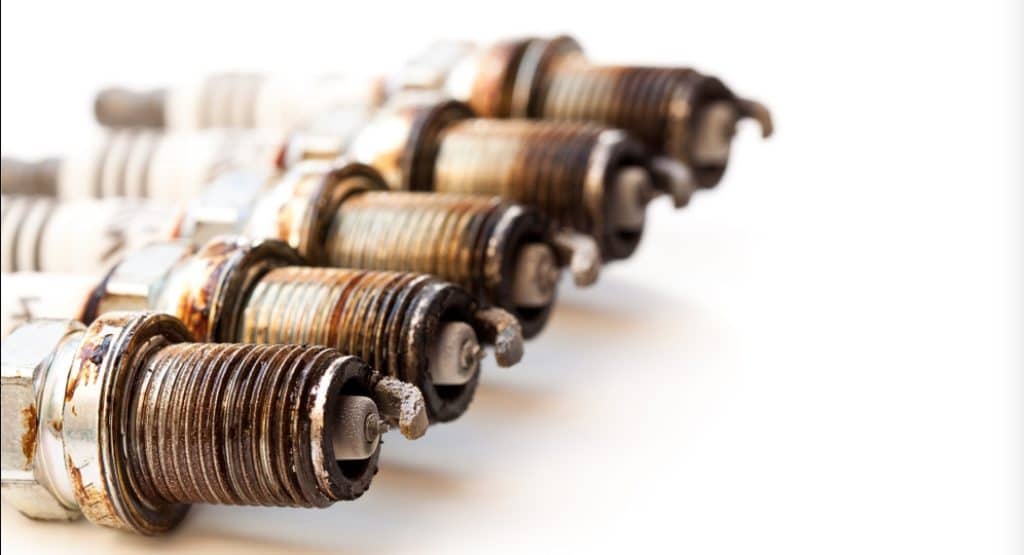
Typical Causes: Bad spark plugs, coil packs, or fuel injectors
A misfiring engine can be a frustrating problem to have, and it’s important to address it right away. The engine in your car relies on a precise combination of fuel, air, and spark to properly ignite.
A misfiring engine should throw a code, but even if it doesn’t, you should still look at the spark plugs. If they stop burning fuel efficiently, it’ll decrease your vehicle’s fuel mileage, and are the most common reason for a misfire.
When your engine is misfiring, it’s not getting the proper combination of air, fuel, or spark. They also need to have the right compression level as well.
Clogged Air Filter
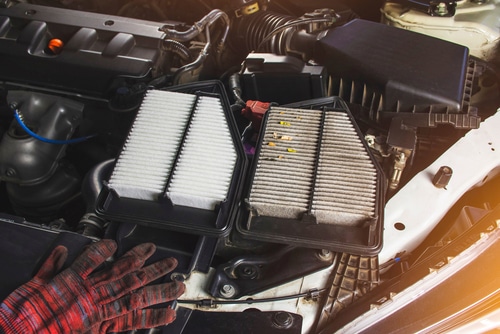
Usually, there is no code associated with a bad air filter. You may hear a hissing sound as air tries to bypass it.
The air filter’s primary purpose is to filter the incoming air before it enters the intake manifold. If you drive on a dirt road regularly or have been off-roading, they can clog up well before the manufacturer’s recommended intervals.
Rodents are known to find their way into a vehicle’s air inlet. A day’s worth of nesting work is enough for them to completely block an air filter. It happens more than you’d think.
If left unchecked, a clogged air filter can restrict airflow and lower fuel economy, as well as cause potentially expensive repair bills due to particulate build up in sensitive engine components.
Looking at the air filter only takes a moment, and replacing it is inexpensive.
Low Tire Pressure
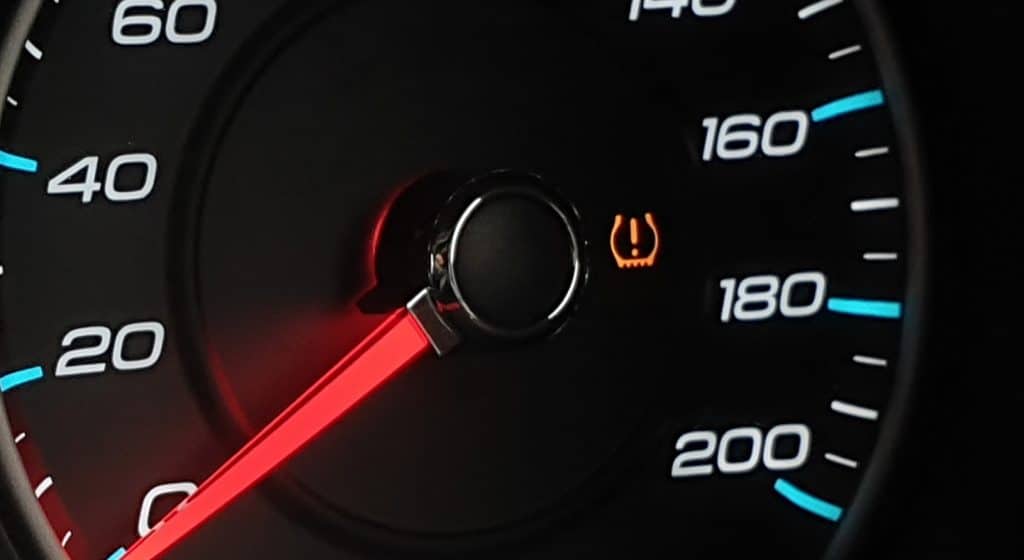
Under-inflated tires can lower gas mileage by about 0.2% for every 1 psi drop in the average pressure of all tires…
per fueleconomy.gov
Low tire pressure will reduce the fuel efficiency of your vehicle as more energy is needed for acceleration.
As you can see above there is a .2% reduction in fuel economy for every PSI the tires are down. Even if you have a vehicle with a Tire Pressure Monitoring System, the TPMS light (pictured above) typically won’t come on until the tires are 25% below the recommended pressure level.
Example
Let’s say the vehicle in question takes 40 PSI per tire, which means 30 PSI is when the tire light comes on. This leaves 9 lbs of pressure that you can miss without the tire pressure light.
9 PSI X .2% = a 1.8% reduction in fuel economy.
Where to Find How Much Air to Put in Your Vehicle’s Tires
There is a sticker inside the driver’s door on all modern vehicles that show exactly how much air pressure goes into each tire, as well as what size tires go on each wheel.
Low Tire Pressure is Dangerous
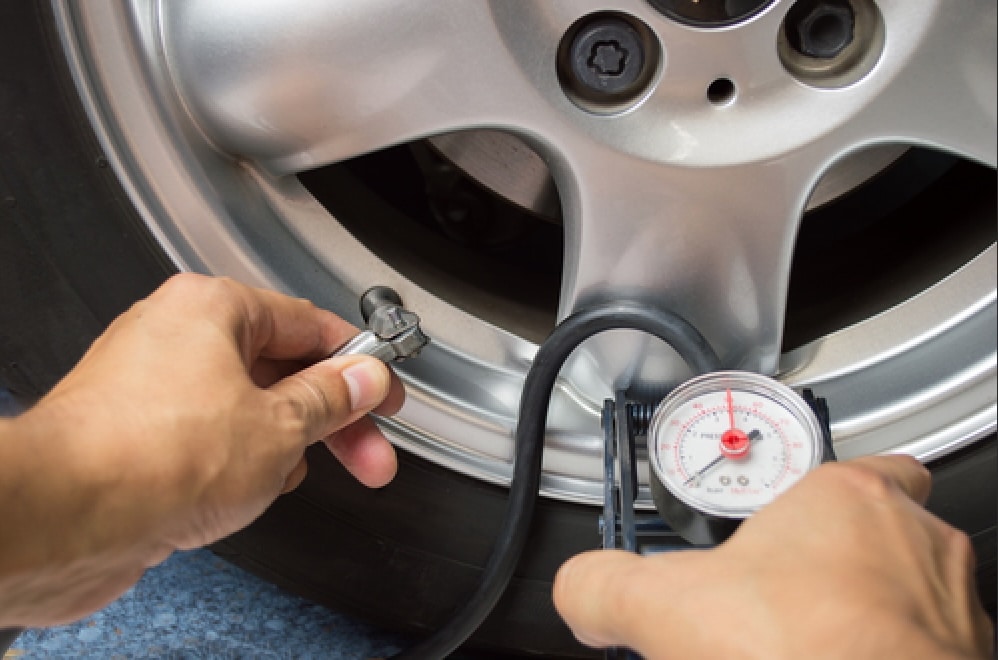
Low tire pressure can cause a number of issues if it is not corrected. A tire with low pressure will have increased wear and tear on the sides, resulting in the treads wearing out quicker and shortening the life of your tires.
In extreme cases, it could even lead to tire blowouts due to uneven pressure across the face of the tire from contact with the road.
For safety reasons, it is advised that you regularly check your tire pressure and fill them when necessary in order to keep your vehicle running smoothly and efficiently.
Brakes Sticking
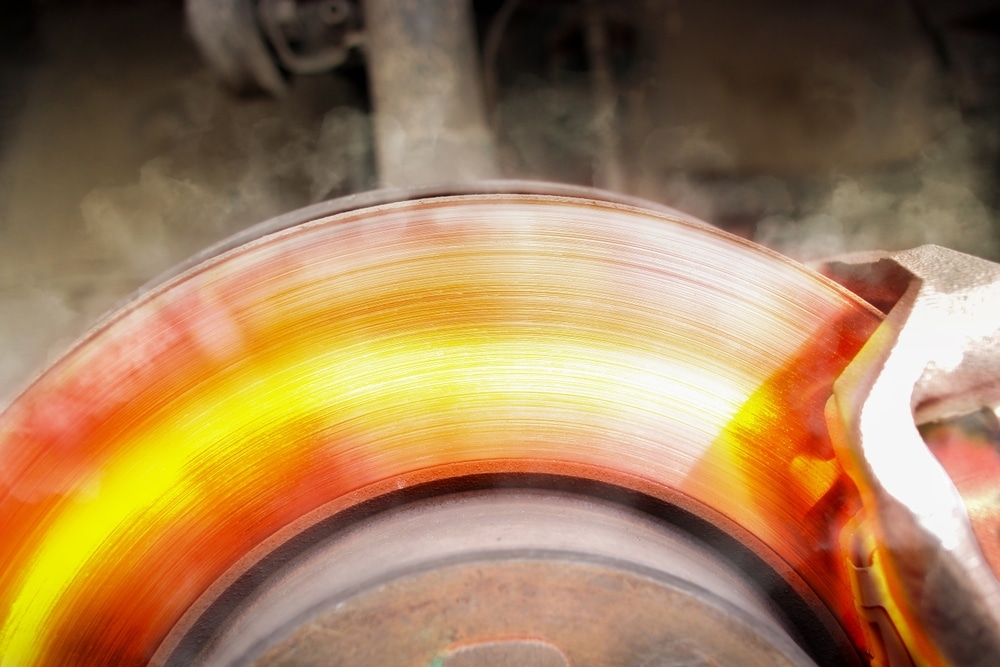
Sticking brakes usually smell.
Brake sticking can be a very dangerous driving experience, your vehicle may pull to the left or right. The engine has to work harder to move your car or truck. It can even lead to a fire if they get hot enough.
Sticking brakes usually occur due to a build up of dust or rust inside the brakes, a failure in the rubber brake lines, a stuck caliper or wheel cylinder, or a crimped hard brake line.
Sticking brakes do not fix themselves. It is dangerous to drive a vehicle if they’re not fixed.
How to Tell if Your Brakes are Sticking
It’s relatively easy to tell if your brakes are sticking. Obviously, if the vehicle is pulling in one direction, that indicates the brakes are sticking. You could also just really need an alignment. There’s more you can do to verify they’re stuck.
- Is there a strong smell coming from a wheel?
- Wave your hand in front of all four wheels without touching them. If one wheel feels hotter, that indicates a brake is stuck.
- Use an infrared temperature gauge to verify what you felt.
- Look at the brake pads. A pad that’s wearing unevenly usually means there’s a stuck caliper
If your brakes ever begin to feel sticky or unresponsive, getting your car into an auto shop as soon as possible is essential for maintaining safety and reliability on the road.
Idling

Idling can cause diminished MPG if you’ve been in a lot of traffic recently.
Idling is the practice of keeping a vehicle engine running, even when it’s not in use. It doesn’t burn gas fast, but it does burn gas. So if you’ve been waiting in pickup line with the engine running, idling is likely to blame for your decrease in MPG.
Other Causes
Here’s a quick list of other potential causes of a fuel mileage drop. They aren’t as common as the ones listed above.
- Excess Weight– Leaving a vehicle full can weigh it down and decrease the average fuel economy.
- Transmission issues– If your transmission isn’t shifting into overdrive, is slipping, or the torque converter isn’t locking, fuel mileage will suffer.
- Vacuum Leak– A vacuum leak can lean out the air-fuel mixture by allowing unmetered air into the engine. You’ll likely get the check engine light and P0174 P0171 too.
- Oxygen Sensor– O2 sensors check the exhaust gasses and help the powertrain control module (PCM) control the air fuel mixture. There’s a myriad of codes that come with a faulty O2 sensor, and they rarely fail without one turning the check engine light on.
- MAF Sensor- The mass airflow (MAF) sensor is responsible for telling the PCM how much air is entering the intake manifold. Like the O2 sensors, it would almost certainly throw a code.
- Clogged Catalytic Converter– If a catalytic converter gets clogged, it’ll cause the engine to choke on its own exhaust. It’ll also increase the backpressure to the point that combustion is suffering.
